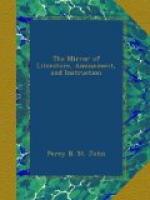“First Delphid injured me, he raised
my flame,
And now I burn this bough in Delphid’s
name.”
Virgil, too, in his 8th Eclogue, alludes to the same charm:—
“Sparge molam, et fragiles incende
bitumine lauros;
Daphnis me malus urit, ego hanc in Daphnide
laurum.”
“Next in the fire the bays with brimstone burn,
And whilst it crackles in the sulphur, say,
This I for Daphnis burn, thus Daphnis burn away.”
Dryden.
The "holly bush" being made to represent the person beloved, may also be borrowed from the ancients:—
-------------------“Terque haec altaria circum Effigiem duco.” Virgil.
“Thrice round the altar I the image draw.”
The burning wax candles may be more difficult to account for, unless it refer to the custom of melting wax in order to mollify the beloved one’s heart:—
“As this devoted wax melts
o’er the fire,
Let Myndian Delphis melt with soft desire.”
Theocritus.
---------------“Haec ut cera liquescit.” -------------“Sic nostro Daphnis amore.” Virgil.
For a woman to compose a garland was always considered an indication of her being in love. Aristophanes says,
“The wreathing garlands in
a woman is
The usual symptom of a love-sick mind.”
Should the charms resorted to by lovers two thousand years ago, appear to you, even remotely, to have influenced the love rites as performed by the village men and maidens of the present day, perhaps you may deem this string of quotations worthy of a corner in your amusing miscellany.
E.
* * * * *
LINES
On the Sarcophagus[2] which contains the remains of Nelson in St. Paul’s Cathedral.
(For the Mirror.)
To mark th’ excess of priestly pow’r
To keep in mind that gorgeous hour,
Thou art no Popish monument,
Altho’ by Wolsey thou wer’t
sent,
From thine own native Italy
To tell where his proud ashes lie.
To thee a nobler part is given!
A prouder task design’d by heav’n!
’Tis thine the sea chief’s
grave to shroud,
Idol and wonder of the crowd!
The bravest heart that ever stood
The shock of battle on the flood!
The stoutest arm that ever led
A warrior o’er the ocean’s
bed!
Whose name long dreaded on the sea
Alone secured the victory!
His Britain sea-girt stood alone,
Whilst all the earth was heard to moan,
Beneath war’s iron—iron
rod,
Trusting in Nelson as her god.—CYMBELINE.
[2] See mirror, No. 306, p 234.
* * * * *




